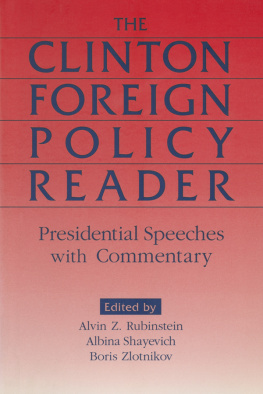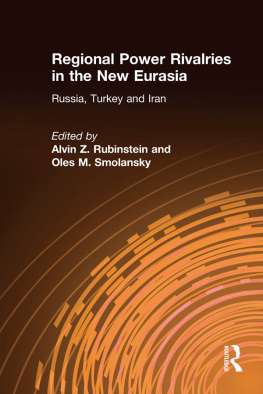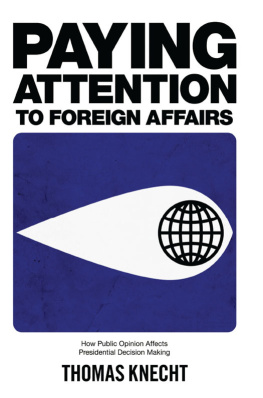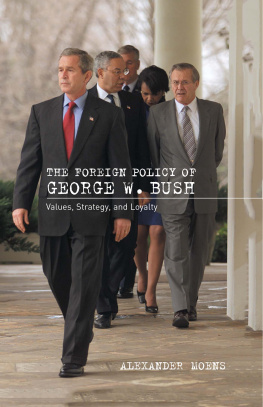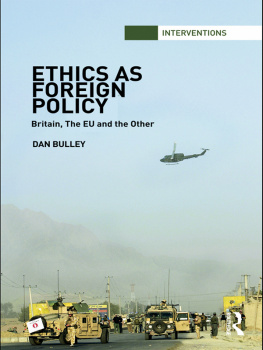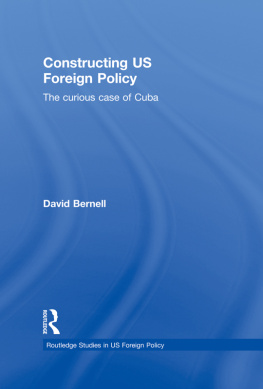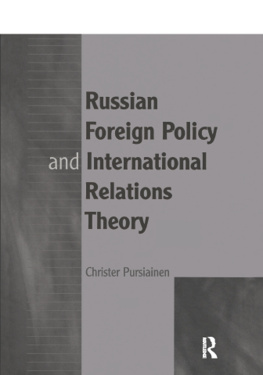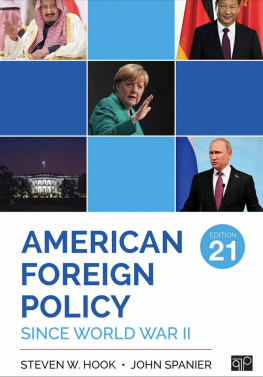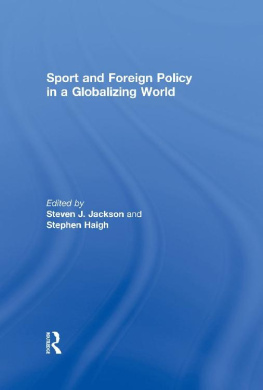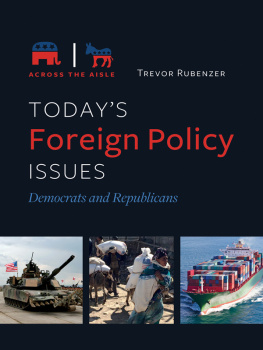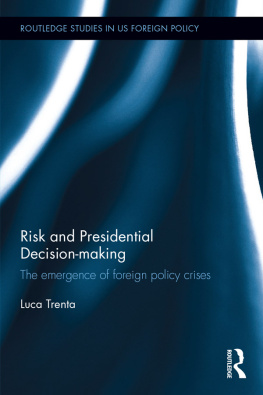THE
CLINTON
Foreign Policy Reader
THE
CLINTON
Foreign Policy Reader
Presidential Speeches with Commentary
Edited by
Alvin Z. Rubinstein
Albina Shayevich and
Boris Zlotnikov
First published 2000 by M.E. Sharpe
Published 2015 by Routledge
2 Park Square, Milton Park, Abingdon, Oxon OX14 4RN
711 Third Avenue, New York, NY 10017, USA
Routledge is an imprint of the Taylor & Francis Group, an informa business
Copyright 2000 Taylor & Francis. All rights reserved.
No part of this book may be reprinted or reproduced or utilised in any form or by any electronic, mechanical, or other means, now known or hereafter invented, including photocopying and recording, or in any information storage or retrieval system, without permission in writing from the publishers.
Notices
No responsibility is assumed by the publisher for any injury and/or damage to persons or property as a matter of products liability, negligence or otherwise, or from any use of operation of any methods, products, instructions or ideas contained in the material herein.
Practitioners and researchers must always rely on their own experience and knowledge in evaluating and using any information, methods, compounds, or experiments described herein. In using such information or methods they should be mindful of their own safety and the safety of others, including parties for whom they have a professional responsibility.
Product or corporate names may be trademarks or registered trademarks, and are used only for identification and explanation without intent to infringe.
Library of Congress Cataloging-in-Publication Data
Clinton, Bill, 1946
The Clinton foreign policy reader : presidential speeches with commentary / edited by
Alvin Z. Rubinstein, Albina Shayevich, Boris Zlotnikov.
p. cm.
Includes bibliographical references and index.
ISBN 0-7656-0583-X (c : alk. paper)
ISBN 0-7656-0584-8 (p : alk. paper)
1. United StatesForeign relations19932. Clinton, Bill, 1946Views on
foreign relations. I. Rubinstein, Alvin Z. II. Shayevich, Albina, 1979III.
Zlotnikov, Boris, 1979IV. Title.
| E885.C545 2000 | 99-059587 |
| 327.73dc21 | CIP |
ISBN 13: 9780765605849 (pbk)
ISBN 13: 9780765605832 (hbk)
Contents
William Jefferson Clinton is the first American president of the post-Cold War era. With the end of the systemic rivalry between the United States and the Soviet Union, which lasted from 1945 to 1991, we entered a period of US global hegemony. According to Secretary of State Madeleine Albright, the United States is now the indispensable nation, the one whose work is never done. Even less triumphalist officials and observers maintain that the world needs US leadership without which nothing major can be achieved.
Over the course of his terms in office, President Clinton has set in motion a pattern of US policy initiatives and responses that will affect US foreign policy for years to comeand perhaps not always with the consequences that were intended. Most of the issues with which he has contended, though seemingly carry-overs from the Cold War era, are in fact substantively very different. Whether they involve Russia or China, the Middle East or the United Nations, ethnic conflicts or weapons of mass destruction, the issues are new, unresolved, troublesome, far-reaching, and present challenging moral and political dilemmas.
As we complete this work, America is enjoying unparalleled prosperity, sustained by the longest and largest economic expansion in the twentieth century. Americans have a general feeling that there are no serious threats for the United Sates to worry about, that globalization heralds a century of American preeminence, and that economics reign, perhaps.
Our aim in assembling this collection of President Clintons foreign policy speeches is to introduce students and other readers to the principal, evolving foreign policy choices that are likely to dominate the agenda of American policymakers for the next decade or more. In order to understand the problems confronting future administrations, it will be essential to know their background in the first post-Cold War years. The speeches have been edited to exclude extraneous remarks, such as salutations expressions of friendship, and reiterations of general principles about democracy, free markets, and support for human rights. They have been organized thematically to provide intellectual focus and facilitate analytical assessment. Each chapter begins with an original essay presenting essential information about the international and domestic context within which the Presidents speech was delivered and tentatively examining its inherent policy implications. We have sought to make as self-contained, integrated, and coherent an assessment of Clintons foreign policy as is feasible within the books structure; and by offering selections from presidential statements, we seek to encourage the reader to reach an independent judgment about the Presidents expressed aims, the means used, and the attendant consequences.
The international system is undergoing a series of revolutionary transformations, and so, too, are the policies of its most prominent and powerful actor. It is time to reassess familiar themes in light of the new ways in which they have been and are constantly changing.
The authors are deeply appreciative of the interest and assistance of Patricia Kolb. From the beginning of this enterprise, her many thoughtful suggestions and editorial expertise were invaluable. Working with her, and her colleagues at M.E. Sharpe, has been a professional pleasure.
Alvin Z. Rubinstein
Albina Shayevich
Boris Zlotnikov
THE
CLINTON
Foreign Policy Reader
When William Jefferson Clinton took office in January 1993, the international environment was different from any that Americans had known since the 1920s: there were no serious military threats and there was an opportunity to look inward and attend to pressing domestic problems. Elected at a time of transition from a bipolar era to an era of unchallenged US military supremacy and global influence, Clinton was determined to tackle long-standing internal challengesgetting control of burgeoning budget deficits, righting imbalances in trade relationships, downsizing defense expenditures, enhancing industrial competitiveness, and establishing preeminence in the field of information technology. He faced an extensive array of domestic difficulties, as Franklin D. Roosevelt had sixty years earlier when he took office during the world wide depression of the 1930s. The centerpiece of Clintons domestic agenda was to be a comprehensive and all-encompassing reform of the existing patchwork system of health care.
Clintons stewardship began at a time of unprecedented international change. The former Soviet Union, a dangerous adversary for decades, had imploded in December 1991, a victim of self-destruction by its own ruling elite, and was no longer a threat. Japan had emerged as a formidable economic-industrial-financial superpower, but was nevertheless an ally dependent on Americas nuclear protection. China was intent on a sweeping program of modernization and gave mixed signals as to its long-term aims, but clearly wanted trade, not tensions. There were unresolved regional conflicts around the world, but none seemed likely to trigger a wider war. The proliferation of weapons of mass destruction remained a source of concern and frustration, and there was the knotty question of what to do about Saddam Husseins Iraq. But as far as one could see, there were few threatening clouds on the foreign policy horizon.

